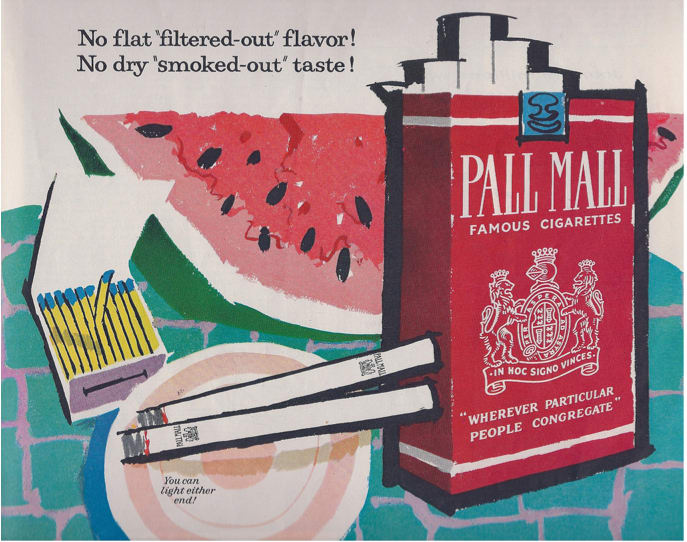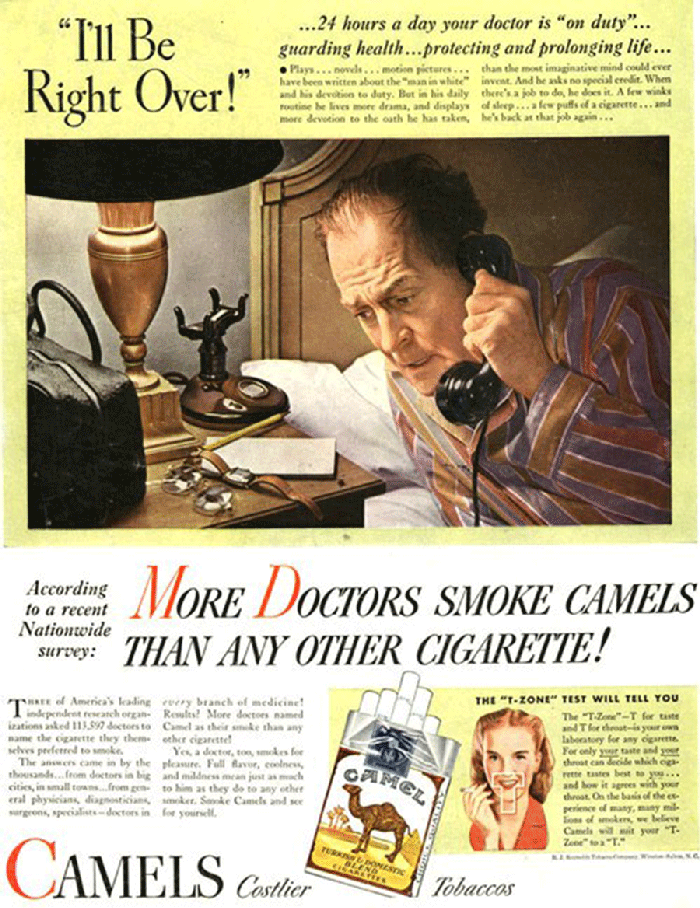
In my Dark Ages middle school days, there was a mom-and-pop store just across the street from our school, and we “more mature” students in grades 8-12 were allowed during morning and afternoon “recess” periods to walk across and partake of various nutritious pick-me-ups: A Coke or big orange belly-washer soft drink, 5 cents; a pack of Planter’s peanuts, also 5 cents (it was the fashion of the time — to this day I’ve never understood why — to dump the peanuts into the soft drink, resulting in lots of fizzing); candy bars of all kinds, packs of gum, bags of potato chips, Moon Pies, all 5 cents.
For those more flush financially, a made on the premises triple-decker half-sandwich of bologna or ham, and cheese, slathered with mayo, was 15 cents (an alternative to the school lunchroom’s more nutritious offerings).
For 50 cents, one could buy a pack of cigarettes — Camel, Lucky Strike, Pall Mall, Philip Morris. Real, straight-up tobacco, long before the advent of filters. If you couldn’t manage 50 cents, the enterprising storekeepers would “break a pack” and sell a single for 5 cents (probably wasn’t legal, or to sell cigarettes to minors, but hey, it was rural small-town Mississippi after all). The front porch of the store, and the yard out front, was filled with boys (no girls were brave enough to smoke openly in those days) puffing away on their cigs.
From time to time, motivational speakers would present assembly programs, showing grainy black-and-white films depicting the horrible health effects of smoking, but since we knew we were going to live forever, it all made scant impact. They also invariably trotted out a chart showing, if we didn’t smoke, how many thousands of dollars we could save over 20 years.
I’ve never smoked or used tobacco in any form, although I inhaled copious amounts of second-hand smoke in the workplace for many years before it was banned. And while I, thankfully, have thus far escaped the horrors depicted in those long-ago b&w anti-smoking films, I can’t recall amassing the promised thousands of dollars by not smoking (more likely, I blew it all on equally addictive hamburgers, colas, and anything chocolate).
All this as prelude to an interesting study by the WalletHub group on the real costs of smoking (out-of-pocket cost for the smokes, health care costs, lost income, and other related costs), state-by-state, over a lifetime. New York, which has the highest tobacco taxes, leads the pack J, at a whopping $2.33 million per person. Lifetime costs for Mid-South states are $1,184,526 for Mississippi; $1,197,792 for Tennessee; $1,208,621 for Missouri; $1,311,314 for Arkansas; and $1,337,361 for Louisiana. Nationwide, they rank fourth, sixth, ninth, fifteenth, and nineteenth lowest, respectively.
There are also per-year costs, by state. In most southern states that have not been as quick to hike tobacco taxes, the total yearly cost is about half that of New York: $23,226 for Mississippi; Tennessee, $23,486; Arkansas, $25,712; Louisiana, $26,223; and Missouri, $23,698. Kentucky is lowest in the U.S., $22,453 per year.
The grimmer stats from the American Lung Association are that tobacco use accounts for nearly half a million deaths in the U.S. each year, and is the leading cause of lung cancer. Total tobacco-related economic and societal costs per year: $300 billion.
Even those around tobacco smokers aren’t safe from its harmful effects. Since 1964, smoking-related illnesses have claimed 20 million lives in the U.S., 2.5 million of which were non-smokers who developed cancer and other diseases from second-hand smoke exposure.
See the complete WalletHub study at http://bit.ly/1Pe7g7S
About the Author(s)
You May Also Like




